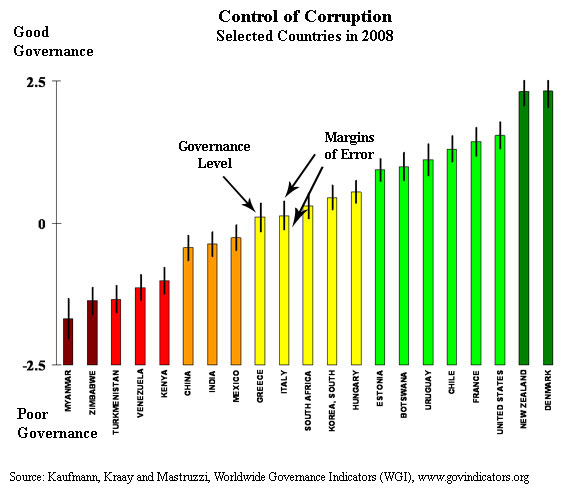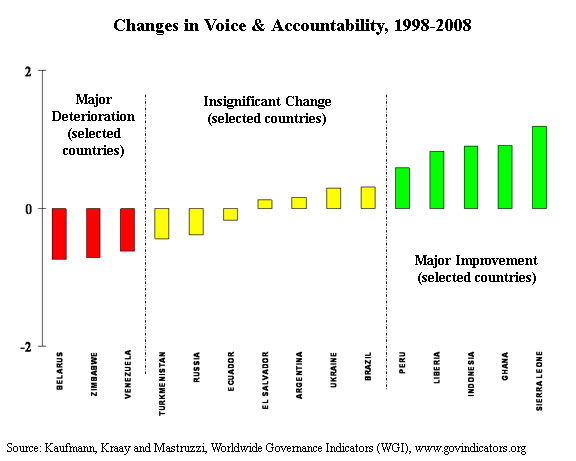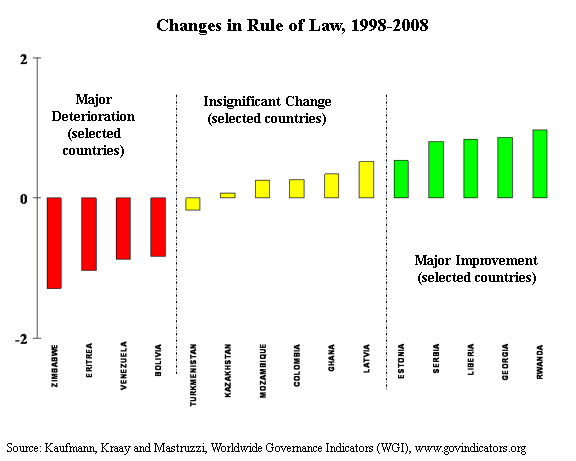Editor’s Note: Daniel Kaufmann, Aart Kraay and Massimo Mastruzzi are the authors of the Governance Matters VIII and the new update of the Worldwide Governance Indicators (WGI). The WGI constitute one of the largest compilations of cross-country data on governance. The aggregate measures and hundreds of individual indicators, on which they are based, are publicly available at www.govindicators.org. The research and indicators do not necessarily reflect the official views of the Brookings Institution, the World Bank, its Executive Directors, or its member governments.
In spite of the growing consensus among policy analysts, civil society groups, aid donors and scholars, that good governance matters for sustained growth and development, implementing concerted reforms to improve governance and fight corruption often do not get priority in industrialized and emerging economies. In-depth research and the proliferation of evidence and empirical measures of institutional quality, governance, and the investment climate, have provided results showing that good governance has had a strong, positive impact on development.
For over a decade, the Worldwide Governance Indicators (WGI) have enabled such research, which has fostered debate and discussion, helped monitor governance performance, and raised awareness about governance issues in the development community and beyond. The latest installment in this series, “Governance Matters VIII: Governance Indicators 1996-2008,” was released today.
The WGI organize and synthesize data, reflecting on the reports and views of tens of thousands of stakeholders worldwide, including respondents to household and firm surveys and experts from nongovernmental organizations, public sector agencies, and providers of commercial business information. The new WGI is based on 35 different data sources from 33 organizations around the world, aggregating the data from hundreds of disaggregated questions, to cover 212 countries around the world.
While the WGI indicate that many countries have made progress in governance and anti-corruption over the past decade, it also reveals that many states have failed to make such improvements, highlighting serious challenges that remain for rich and poor countries alike. In fact, not only do many countries exhibit little progress on governance over the past decade, but others have regressed in some key dimensions. The WGI show that current governance standards have plenty of room for improvement in many industrialized countries and emerging economies.
We have defined governance as the traditions and institutions by which authority in a country is exercised. This includes political, economic and institutional dimensions of governance. Specifically, it refers to how governments are selected, monitored and replaced; the governments’ capacity to effectively formulate and implement sound policies and provide public services; and the respect of citizens and the state for the institutions that govern economic and social interactions among them.
We measure six basic dimensions of governance in the WGI, corresponding to this definition:
Voice and Accountability: the extent to which a country’s citizens are able to participate in selecting their government, as well as freedom of expression, association, and the press.
Political Stability and Absence of Violence: the likelihood that the government will be destabilized by unconstitutional or violent means, including terrorism.
Government Effectiveness: the quality of public services, the capacity of the civil service and its independence from political pressures; the quality of policy formulation.
Regulatory Quality: the ability of the government to provide sound policies and regulations that enable and promote private sector development
Rule of Law: the extent to which agents have confidence in and abide by the rules of society, including the quality of property rights, the police, and the courts, as well as the risk of crime.
Control of Corruption: the extent to which public power is exercised for private gain, including both petty and grand forms of corruption, as well as elite “capture” of the state.
Research based on these indicators have resulted in a number of findings and insights:
Better governance helps in the fight against poverty and improves living standards. Research evidence points to a very high development dividend from good governance. There are multiple mechanisms through which capable public sector institutions, as well as an independent judiciary, property rights protection, civil liberties and press freedoms, and effective regulatory and anticorruption institutions result in sustained long-run development and poverty reduction. The research indicates that when governance is improved by one standard deviation, infant mortality declines by two-thirds and incomes rise about three-fold in the long run. Such advances in governance are readily achievable where political will to implement reforms is present, since one standard deviation improvement in governance constitutes just a fraction of the difference between the worst and best performers. For example, in the dimension of Rule of Law, one standard deviation is all that separates the very low ratings of Afghanistan or Zimbabwe, from the still-low ratings of countries such as Nigeria or Paraguay; or the moderate ratings of Turkey or Ghana from the stronger ratings of Portugal or Chile; or what separates these from some of the best performers such as Norway or New Zealand.
Good governance is not the exclusive preserve of rich countries. In fact, over a dozen developing and emerging countries including Slovenia, Chile, Botswana, Estonia, Uruguay, Czech Republic, Hungary, Latvia, Lithuania, Mauritius, and Costa Rica have governance scores better than those of industrialized countries such as Italy or Greece (Figure 1). The largest and most powerful economies in the world, as represented in the G-20 for instance, do not tend to exhibit the best standards of governance around the world. As detailed in previous writings, there is much that can be learned from good governance examples in countries outside the G-20.
Where there is commitment to reform, improvements in governance can and do occur. Over the past decade from 1998-2008, countries in all regions have shown substantial improvements in governance, even if starting from a very low level. Examples include Ghana, Niger, and Peru in Voice and Accountability (Figure 2); Algeria, Angola and Sierra Leone in Political Stability and Absence of Violence/Terrorism; China, Colombia, and Rwanda in Government Effectiveness; the Democratic Republic of Congo, Georgia and Libya in Regulatory Quality; Latvia, Liberia and Rwanda in Rule of Law (Figure 3); and Indonesia, Liberia and Serbia in Control of Corruption.
Significant improvements in governance can and do occur. They occur even over the relatively short period of a decade, as shown in (Figures 2 and 3). In fact, nearly one-third of countries in the WGI show a significant change in at least one of the six aggregate indicators between 1998 and 2008, roughly equally divided between improvements and declines.
Yet, on average, there is no evidence of a significant improvement in the quality of governance around the world over the past decade. Despite the progress noted for some of the individual countries above, others have experienced deteriorations in several governance dimensions, including Zimbabwe, Cote d’Ivoire, Belarus, Eritrea and Venezuela, among others. And in many other countries, no significant change in either direction is yet apparent in recent years.
Measuring governance is difficult, and all measures of governance are necessarily imprecise, requiring interpretative caution. A unique feature of the WGI is its transparent recognition of this imprecision, in the form of explicitly reported margins of error for all country scores that need to be considered when comparing countries. Simply looking at differences in governance scores is often insufficient, since some changes may be too small to be meaningful. It is thus important to estimate and disclose the margins of error with every country score, as shown in Figure 1. Thanks to improvements over time in the WGI, such margins of error have declined, and, even though they remain non-trivial, they are significantly less than the imprecision in any individual indicator of governance.

The Brookings Institution is committed to quality, independence, and impact.
We are supported by a diverse array of funders. In line with our values and policies, each Brookings publication represents the sole views of its author(s).




Commentary
Op-edGovernance Matters 2009: Learning From Over a Decade of the Worldwide Governance Indicators
June 29, 2009